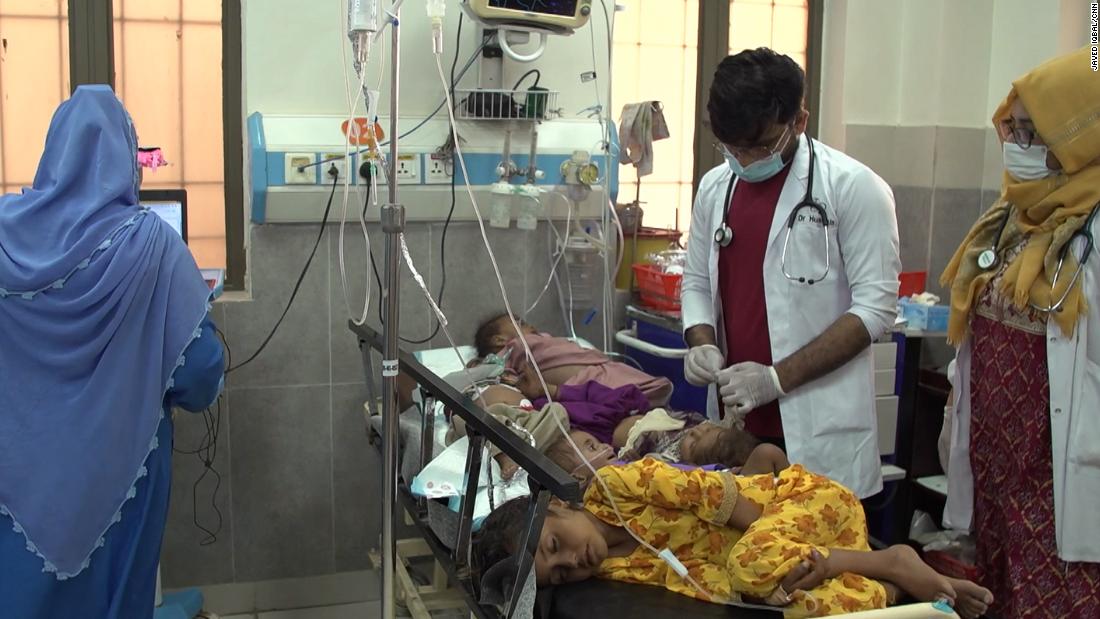One hour later, another child succumbs to her illness. Her weeping grandmother watches in despair as doctors also wrap her in white.
The children died from cholera, an acute diarrheal illness contracted by drinking water contaminated with bacteria.
And they were not the only ones.
Dozens more children sleep cramped together on beds in the facility’s emergency room; some unconscious from their illness, others crying in pain. Pale and lethargic, their protruding ribs and bulging eyes are all symptoms of malnourishment.
Exhausted parents wait in the room next door in deafening silence. Numb and defeated, they do not know if their child will make it out of the hospital alive.
“The floods came and the rain fell. And then our patients came in like the floods,” said Dr. Nazia Urooj, physician in-charge at the hospital’s children emergency unit.
The disaster is only beginning
The force of the floodwater washed away homes, leaving tens of thousands stranded on the road without any food to eat or clean water to drink.
In Sindh, one of the worst-impacted provinces, villages have been completely cut off, making it nearly impossible for families to seek help for their sick children.
“Many children are not even reaching hospitals because the medical facilities they could access are either underwater or just not accessible,” said Aadarsh Leghari, UNICEF’s Communication’s Officer in Pakistan.
On the outskirts of Qazi Ahmed, a town in Sindh, a mother carries her young child on a rickety boat transporting stranded residents to health facilities.
“She has got a high grade fever and become unconscious,” the mother said, while desperately trying to cool her daughter’s forehead with a cloth soaked in the dirty floodwater that made her sick.
The boats are packed with families seeking help. In the distance, parents wade waist-deep with their children and belongings, in an attempt to cross the flooded road.
Elsewhere, a young, pregnant mother of five attempts to soothe her children as they wail with hunger. Flies swarm around their faces as they cry for her attention.
Severely anemic, she makes a desperate plea for help.
“There’s no blood in my body. I need two bottles of blood,” she said, before she picks up one of her children and pats them to sleep. “I don’t think well. I have a fever. I need blood.”
A ‘plethora’ of disease
As the floodwater slowly recedes, a new disaster is emerging as tens of thousands grapple with diseases such as diarrhea, dysentery, dengue fever and malaria.
And it is the nation’s poorest that are most vulnerable. Rani, a mother who brought her sick three-year-old son, Abbas, to the Mother and Child Healthcare Hospital, said their village was surrounded by floods and their home completely destroyed, forcing them to live under a plastic sheet on the road.
During the day, Rani and her family endure scorching temperatures and dehydration. And at night, the mosquitoes “attack,” she said.
“We burn waste so mosquitoes cannot bite (the children),” Rani said. “We remain active at night so our children can sleep.”
Sindh has seen an acute outbreak of dengue fever — a viral infection transmitted by the Aedes mosquito, the same insect responsible for spreading Zika, chikungunya and yellow fever.
It causes flu-like symptoms, including piercing headaches, muscle and joint pains, fever and rashes, though only 25% of those infected show symptoms. Extreme cases can bring bleeding, shock, organ failure, and potentially death.
Leghari from UNICEF said mosquitoes in the province were a cause for concern.
“There are no mosquito nets. It’s the mosquitoes that are bringing in malaria and disease,” he said. “The other is cholera… it’s like a plethora of disease coming out of these floodwater lakes. This is going to turn into a bigger health crisis.”
In a statement last week, the United Nations called the situation “alarming.”
“Millions of children are still grappling to survive, and we fear thousands will not make it,” the statement said.
In the waiting room of the hospital, Mai Sabagi, the grandmother of a five-year-old girl who had just died from cholera, said her family didn’t have the 1,000 Pakistani rupees ($4) needed to take her body away.
Her seven-year-old grandson died in another hospital. Two more of her grandchildren are also sick.
“All this has happened because of the rains,” she said. “We lost our clothes … everything. Our house has been damaged. We have not been given any relief. Poor people cannot afford treatment.”
Note:- (Not all news on the site expresses the point of view of the site, but we transmit this news automatically and translate it through programmatic technology on the site and not from a human editor. The content is auto-generated from a syndicated feed.))




Thanks for the auspicious writeup. It actually was a leisure account
it. Look advanced to more introduced agreeable from you! However, how
can we be in contact?
Great weblog here! Also your website rather a lot up fast!
What web host are you the use of? Can I get
your associate hyperlink for your host? I desire my web site loaded up as fast as yours lol
I’m not certain the place you’re getting your info, but good topic.
I must spend a while finding out much more or working out more.
Thanks for wonderful information I used to be looking for this info for my
mission.
http://w1.bocoranprediksi.buzz/
Since the admin of this website is working, no uncertainty very rapidly it will be renowned, due to its quality
contents.
I’ll right away grab your rss as I can not find your e-mail subscription hyperlink or
newsletter service. Do you’ve any? Kindly allow me recognise
so that I may subscribe. Thanks.
I have read so many content on the topic of the blogger lovers except this post is in fact a fastidious
article, keep it up.
продажа аккаунтов соцсетей продажа аккаунтов соцсетей
безопасная сделка аккаунтов биржа аккаунтов
маркетплейс аккаунтов соцсетей аккаунты с балансом
продажа аккаунтов продажа аккаунтов соцсетей
купить аккаунт с прокачкой аккаунт для рекламы
продажа аккаунтов площадка для продажи аккаунтов
Accounts marketplace https://accountsmarketplacepro.com
продажа аккаунтов https://akkaunt-magazin.online/
продать аккаунт https://akkaunty-optom.live
продажа аккаунтов купить аккаунт
маркетплейс аккаунтов соцсетей https://akkaunty-dlya-prodazhi.pro/
маркетплейс аккаунтов https://kupit-akkaunt.online/
buy facebook account for ads https://buy-adsaccounts.work
buy aged facebook ads accounts https://buy-ad-accounts.click
I visited several websites except the audio feature for audio songs current at this web page is in fact wonderful.
cheap facebook account https://buy-ad-account.top
Wonderful beat ! I wish to apprentice whilst you
amend your site, how can i subscribe for a blog website? The account helped me a acceptable deal.
I have been a little bit acquainted of this your broadcast offered bright transparent concept
Hello to all, the contents existing at this website are
truly amazing for people knowledge, well, keep up the nice work fellows.
Last night, I randomly got up at around 3 AM,
still thinking about Kaiji. The tension in that anime lingers long after it ends.
Something cool I found out is that Kaiji’s gambling games are
actually based on real psychological and game theory concepts.
It adds a whole new layer to the experience.
Still wide awake, so I decided to read an article that explained the psychology behind the anime.
Trust me, it’s worth checking out if Kaiji hooked you like it did me.
With my brain still spinning, I opened up my favorite online casino
and decided to spin a few reels. I picked Gate of Olympus—something about the vibe just matched.
You’re not going to believe this—I won $1000. Blew my mind.
What I always enjoy about Book of Dead is the
thrill of expanding symbols triggering unexpectedly.
It’s got me thinking… was it pure chance? Or did Kaiji awaken something?
Let me know your thoughts below.
A few hours ago, I woke up at around 3 AM, haunted by thoughts of Kaiji.
The tension in that anime lingers long after it ends.
A fact I came across not long ago is that many of the games in Kaiji reflect real-life underground gambling strategies.
No wonder it feels so real.
I couldn’t go back to sleep, so I decided to read an article that explained
the psychology behind the anime. Seriously, if you’re into anime or gambling,
you need to read it too.
Still buzzing from it all, I logged into my favorite
online casino and played a few rounds. I picked Book of Ra—it just felt
right in that moment.
You’re not going to believe this—I scored a grand.
Totally unexpected. What I love about Book of
Dead is the thrill of expanding symbols triggering unexpectedly.
I keep asking myself… was it pure chance? Or was that destiny?
Let me know your thoughts below.